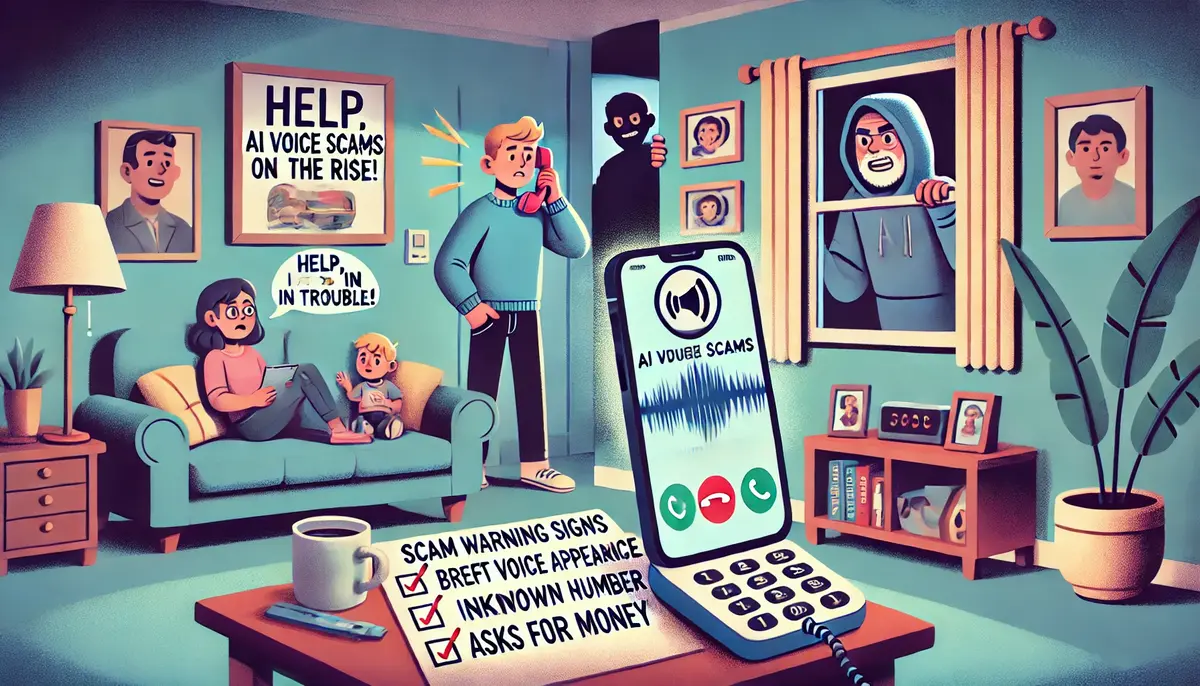Could you fall for an AI voice scam without even knowing it? Yes, and it can happen fast. AI makes life easier, but it also helps scammers. They only need a few seconds of your voice. It can come from a video, voicemail, or social media clip.
They use it to create a fake voice that sounds just like you. Then they pretend to be someone you trust, such as your child or boss, and ask for help or money.
About 77% of people who fall for these scams lose money. Most of the time, scammers get voice clips from social media. The good news is, you don’t have to be scared. Just stay alert and learn the warning signs.
Let’s discuss AI voice scams in detail!
How Do AI Voice Scams Work?
An AI voice scam starts with just a short clip of someone’s voice. It could come from a voicemail, social media post, or even a birthday video. Scammers use that clip to create a fake voice that sounds shockingly real. Once they clone the voice, they can make it say anything they want.
They might use it to communicate with smart devices or deceive banks. Some use it to make fake videos that sound real. Others pretend to be someone you know and ask for help. In rare cases, they’ve used cloned voices to fake kidnappings. The voice sounds so real — with the same tone, pauses, and accent. And with a fake caller ID, the call even looks legit. That’s why these scams work so well.
The Usual Playbook: Step by Step
Step 1: Scouting the Victim
Scammers search your social media. They look for names, photos, job info, or anything personal. Even a few posts can give them what they need.
Step 2: Cloning the Voice
They find a short audio clip of someone you know, often a family member. Just a few seconds is enough to copy their voice.
Step 3: Making the Call
Then they call you using a fake voice. You might hear your daughter crying or your brother asking for help.
Step 4: Creating Panic
The scammer claims there’s an emergency, such as an accident or arrest. They want you scared so you won’t think clearly.
Step 5: Asking for Money
Finally, they ask for money. They want you to send it through gift cards, crypto, or a wire transfer. These methods are hard to trace, and once they’re sent, they’re gone.
How to Spot AI Voice Scams Before It’s Too Late
Spotting an AI voice scam isn’t always easy. The voice sounds real. The message feels urgent. But if you stay calm and know what to look for, you can catch it in time. Here are signs that something might be wrong:
1. The Voice Only Speaks Briefly
Scammers don’t let the fake voice talk too long. They might start the call with a short line, like “Mom, I’m in trouble…” Then someone else takes over and claims to be a cop or lawyer.
If the voice vanishes quickly, that’s a warning sign.
2. They Can’t Answer Simple Questions
AI can copy a voice, but not memories. If the person on the phone struggles with basic personal questions, be suspicious. Ask something like, “What did we eat on your last birthday?”
If they pause, give a weird answer, or dodge it, hang up.
3. The Call Comes From a Strange Number
Many AI voice scams use unknown or international numbers. Some look local but are fake. If you don’t recognize the number, and it feels urgent, slow down. Scammers often spoof the caller ID to gain your trust.
4. The Voice Passes the Call to Someone Else
Scammers may start with the cloned voice, then quickly switch. Now a stranger says they’re a lawyer, kidnapper, or police. This is meant to scare you fast. If the voice hands off the call that quickly, stop and question it.
5. They Ask for Untraceable Payments
If someone asks you to send money through gift cards, crypto, or a wire transfer, it’s likely a scam. These payment methods are hard to track. No real emergency works like that. Take a breath, and don’t panic.
Common AI Voice Cloning and Deepfake Scams
AI voice scams don’t just come in one form. They appear in many forms, and most seem genuine. Here are five common ones to watch for:
1. The Fake Kidnapping Call
You answer the phone and hear your child crying. Then someone else says they’ve taken them and demands money. It sounds dramatic, but it’s real. And all they need is a short voice clip.
How to stay safe:
- Use a family code word. If the caller doesn’t know it, hang up.
- Call your loved one on another number to check they’re okay.
- Ask a personal question only your real child would know.
2. The Grandparent Scam
Scammers pretend to be a grandchild in trouble, hurt, jailed, or stuck somewhere. They sound scared and real. That’s the trick.
How to stay safe:
- Slow down and stay calm.
- Call another family member to confirm.
- Never share private or bank info during the call.
3. Fake Celebrity Endorsements
You see your favorite celebrity promoting a product online. But it’s not them. It’s an AI deepfake trying to get you to buy something fake.
How to stay safe:
- Don’t trust every ad you see. Look for odd movements or glitches in the video.
- Always research before buying anything.
4. Voice Cloning to Hack Accounts
Scammers use your voice to call banks or companies. They pretend to be you and try to access your accounts.
How to stay safe:
- Use security questions that only you can answer.
- Turn on two-factor authentication for extra protection.
- Set up alerts for login attempts and money transfers.
5. Fake Friend Asking for Help
You get a call from a friend asking for money fast. They sound upset and say it’s an emergency. But it’s not them.
How to stay safe:
- Ask a personal question or request a video call.
- Don’t send money through gift cards, cryptocurrency, or wire transfers.
- If they say “Don’t tell anyone,” that’s a red flag.
How to Avoid AI Voice Scams
The best way to avoid an AI voice scam is to stay alert. These scams move fast, but a few small habits can keep you safe. Here’s what helps:
1. Use a Family Safe Word
Pick a special word only your family knows. If a call feels wrong, ask for the word. No word? Hang up.
- Tip: Choose something easy to remember but hard to guess.
2. Always Call Back
Don’t react to panic calls. Hang up and call the person yourself. The real story is often very different.
- Tip: Use a second device or contact someone else as well.
3. Watch What You Share
Scammers steal voices from public posts. Even short clips can be cloned.
- Tip: Lock your privacy settings on social media.
4. Use Scam Blocking Tools
Some apps warn you before you even answer. They spot strange voices and patterns.
- Tip: Use trusted, well-reviewed blockers.
5. Secure Your Accounts
Strong passwords and 2FA help keep accounts safe. Don’t let scammers get further access.
- Tip: Use a mix of letters, numbers, and symbols.
6. Get a Security App
Some tools protect you from scams, phishing, and ID theft. One tool can guard many things.
- Tip: Pick one with alerts, call filters, and account protection.
7. Stay Updated
Scam tactics keep changing. The more you know, the safer you stay.
- Tip: Follow online safety blogs and share what you learn.
FAQs
1. What is an AI voice scam, and how does it work?
An AI voice scam happens when scammers use technology to copy someone’s voice. Just a few seconds from a video or voicemail is enough. They use that voice to fake emergencies or ask for favors. The cloned voice sounds remarkably real, with its tone, accent, and even breath. And with a fake caller ID, the call looks legit. It’s sneaky, but knowing how it works helps you stay alert.
2. How can I tell if a phone call is part of an AI voice scam?
If the voice sounds rushed or only speaks for a moment, be careful. Often, a fake voice says something urgent, then someone else takes over. If they can’t answer personal questions or get defensive, that’s another red flag. Also, be cautious of unknown or foreign numbers and pressure to send money quickly.
3. What kinds of scams are using AI voice cloning right now?
Fake kidnapping calls are one of the scariest. Others include scammers pretending to be a grandchild or a friend in trouble. Some create phony celebrity videos to sell products. Others use your cloned voice to trick banks. These scams all use emotion, pressure, and urgency to get what they want.
4. How can I protect myself and my family from AI voice scams?
Set a family “safe word” that only you all know. If something feels off, ask for it. Always call loved ones back directly. Keep personal videos private, and use scam-blocking tools. Strong passwords and two-factor authentication also provide additional protection. A good security app adds an extra layer of safety.
5. What should I do if I think an AI voice scam has targeted me?
Stay calm. Hang up and contact the real person through a trusted number. If you sent money, call your bank right away. Report the scam, and tell others about it. Sharing what happened can help someone else avoid the same trap.








